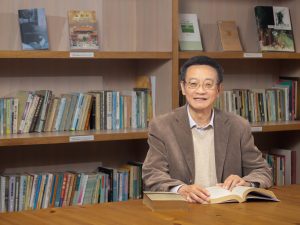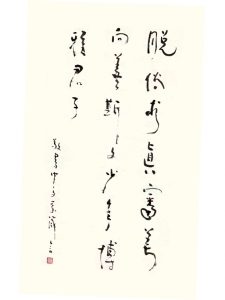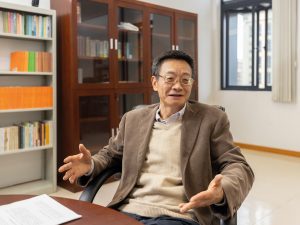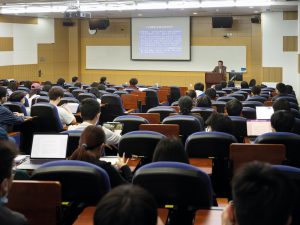In early 2022, Yuan Yulin, a leading figure in linguistics at Peking University, joined the University of Macau (UM) to serve as a chair professor and the head of the Department of Chinese Language and Literature. In his new role, he was immediately impressed by the strong academic foundation of the department. ‘I believe that in time we will create a positive influence on the study of Chinese language and literature and will earn a good reputation in the academic community,’ he says. With over 30 years of experience in linguistics research, Prof Yuan believes there is a greater cause behind linguistics research: ‘The ultimate goal of linguistics research is to benefit humanity.’
Knowledge of Natural Science Crucial for Linguistics Research
Prof Yuan’s academic journey has been inextricably linked to Chinese language and literature, the field in which he obtained his bachelor’s, master’s, and PhD degrees. After receiving his PhD from Peking University in 1990, he worked in the Departments of Chinese Language and Literature at both Peking University and Tsinghua University for a total of 25 years. Surprisingly, as a child, Yuan was interested in mechanical design and he dreamed of becoming an inventor and a mechanical designer, instead of a linguist.
Because of his rural background and the particular generation to which he belonged, Yuan did not have the opportunity to pursue an education in science and technology. In 1978, he enrolled in Jiangsu Normal College-Suzhou to study linguistics, a branch of the humanities with a strong resemblance to natural science. For this reason, despite being a student in the humanities, he was able to learn theories and methods of natural science and apply them in linguistics research. ‘There is always a silver lining in life, and I feel my time was well spent over these years,’ says Prof Yuan modestly.
Driven by his passion, Yuan studied hard and read widely, aiming to integrate his knowledge of linguistics and natural science. His research efforts in the studies of syntax, semantics, and pragmatics have earned him a prominent place in these fields. Today, he is the author of more than ten influential books, including Cognition-based Studies on Chinese Grammar, A Cognitive Investigation and Fuzzy Classification of Word-class in Mandarin Chinese, and Focal Structure and Semantic Interpretation of Chinese Sentences. He was awarded the prestigious title of Changjiang Distinguished Professor and was selected into the third batch of leading scholars in philosophy and social sciences in China’s Ten Thousand Talents Programme.
Over the past century, academics outside China have considered linguistics a pilot field in the humanities. According to Prof Yuan, this is because linguistics research has been strongly influenced by natural science, which has given rise to a large number of interdisciplinary fields, such as mathematical linguistics, quantitative linguistics, computational linguistics, neurolinguistics, psycholinguistics, cognitive linguistics, and pathological linguistics. As an old Chinese saying goes, ‘Without learning poetry, it is impossible to speak with elegance and fluency.’ This statement can also be applied to linguists: Without knowledge of natural science, you will not be fit to pursue research in linguistics.
The Guiding Star of an Academic Career
Prof Yuan’s encounter with natural science took place in 1981. He was barely 20 years old and working as a teacher at Qiandeng Middle School in Kunshan county, Jiangsu province. He borrowed the book Cybernetics: Or Control and Communication in the Animal and the Machine from the school library and was fascinated by the concepts and arguments introduced by the author. In his master’s programme, he studied information theory, cybernetics, and systems theory. ‘From the literature, I learned about the nature of information, which helped me establish my way of thinking from the perspective of communication and control,’ he says. It was during this time that his passion for computation took root, and began to inspire his academic journey.
During his PhD studies, Yuan participated in seminars on the philosophical foundation of artificial intelligence (AI). He also studied valency of nouns from the perspective of computational natural language understanding (In linguistics, valency is a measurement that describes the number of different noun phrases that can be governed by a verb, and has then been extended to adjectives and nouns). Moreover, Yuan immersed himself in Herbert Simon’s Reason in Human Affairs, which he read extensively.
It was from this point that Yuan started to develop a conception of symbolic cognition. He explains that the theoretical perspectives of symbolic cognitive psychology have been the guiding star of his academic career and the common thread running through his years of linguistics research. Such a philosophy of mind also explains why he associates the cognitive study of language with computational analysis in his research.
Pursuing Linguistics Research for a Greater Cause
Prof Yuan’s studies provide insight into the innovative and interdisciplinary nature of linguistics research. His book A Cognitive Study and Computational Analysis of Language explores the structure of language as well as psychological mechanisms of semantic understanding from the perspective of cognitive science. Through computational analysis, the book explains how linguistics research can provide appropriate methods and rules to realise computational natural language understanding. ‘While the human mind can be understood as a computational process for symbol processing, the process of understanding human language can be understood as a computational process of knowledge representation, which makes it technically possible for computers to understand natural language,’ says Prof Yuan. ‘The computational analysis of language is therefore considered a natural extension of the cognitive study of language.’
Prof Yuan has attained a solid theoretical foundation in natural science and accumulated rich knowledge of humanities. He is passionate about research and remains true to his original belief that those pursuing linguistics research should do so for a greater cause — to benefit humanity by seeking answers to the most profound questions. ‘As a human race, we should think about the following questions: What are human beings? Where do we come from? Where are we heading to?’ he says. ‘You may ask what language and linguistics research have to do with these questions. In my opinion, they are all related.’
Prof Yuan believes that linguistics research can provide a better understanding of not only humans’ role in the world, but also their nature. ‘This is a fundamental philosophical question. It is generally accepted that what makes humans stand out from all the living beings in the world is that they can think and have thoughts. And thinking, at least abstract thinking, cannot happen without language,’ he says. ‘According to the renowned linguist Avram Noam Chomsky, the abstract ideas in our thinking process and the meaning of words are essentially the same things. This is why there is a saying in cognitive science that language is a window into the human mind. Language ability is part of the basic configuration of every human being, so it provides a pathway for us to learn more about humans.’
Languages are the Foundation of a Nation’s Culture
The Department of Chinese Language and Literature is one of the first departments established at UM. The department features a well-established discipline, a strong faculty, a comprehensive pedagogical framework, and a rigorous and open academic atmosphere. ‘Although our faculty team is relatively small, most of the faculty members come from renowned universities in China or abroad. They all have strong academic backgrounds and the aspiration to achieve success in their fields,’ says Prof Yuan.
He adds that faculty members and students in the department can gain a comprehensive understanding of languages in China and their evolution through research. ‘Languages are the foundation of a nation’s culture. In today’s information age, both the digitisation and automation process of language data require a systematic and in-depth understanding of human language,’ says Prof Yuan, who formed a research team after joining UM and is working closely with other departments at the university to conduct interdisciplinary research, including a study on semantic reasoning models for explainable AI and their mechanisms.
At the plaque unveiling ceremony for UM’s Centre for Linguistics held in March 2022, Prof Yuan gave his first academic lecture at the university. Titled ‘Polarity in the Semantics of Adjectives and Relevant Syntactic Conditions’, the lecture discussed how human sensory mechanisms affect the meaning and use of adjectives in a language.
Cultivating the Cultural Character of Students in the Department
Prof Yuan proposes cultivating the cultural character of ’seeking the truth and appreciating goodness’ in students of the Department of Chinese Language and Literature. He also believes that students in the department should ‘develop an erudite temperament and build a wealth of knowledge’. The department hopes to achieve these goals through academic and research activities. Prof Yuan adds that members of cultural circles often consider knowledge as the key to nurturing young adults, as it can develop their moral character: ‘For this reason, I hope our students will continue to absorb knowledge, cultivate humanistic qualities, refine their character, and respect life and dignity. I also hope that they will explore the richness of the human world, search for the meaning of existence, and eventually find the value of life. These are the inherent qualities of esteemed scholars in Chinese studies, and they provide the cultural capital for our students to explore the world after graduation,’ he says.
When he is not working, Prof Yuan spends most of his time reading books, and he has accumulated a wealth of knowledge from different disciplines. He has compiled a recommended reading list for students in the department and often shares articles with them. ‘We read because we are driven by our interest and curiosity. The next step is to examine the content with a critical eye to develop our insights,’ he says.
To gain a comprehensive understanding of the Chinese language and literature, Prof Yuan stresses the importance of developing a deep appreciation for the unique characteristics of Chinese culture and civilisation. ‘Students should consider two perspectives,’ says Prof Yuan. ‘Firstly, they should broaden their knowledge of the world and keep themselves updated on global events to avoid developing a narrow-minded perspective. Secondly, they should analyse Chinese civilisation in the context of global civilisation and compare its strengths and weaknesses. By observing and experiencing the value of Chinese civilisation through the lens of human civilisation and global history, students can identify how Chinese civilisation should evolve to regain its vitality in the future.’
Text / Ella Cheong
Photo / Jack Ho, with some provided by the interviewee
English Translation / Winky Kuan
Source: UMagazine ISSUE 27

Prof Yuan Yulin

Some of Prof Yuan Yulin’s publications

Prof Yuan Yulin has proposed ‘seeking the truth, appreciating goodness, developing an erudite temperament, and building a wealth of knowledge’ .

Prof Yuan Yulin thinks that faculty members and students can gain a comprehensive understanding of languages in China and their evolution through research

Prof Yuan Yulin gives a talk on the art of linguistic expression to students in a general education course at UM
